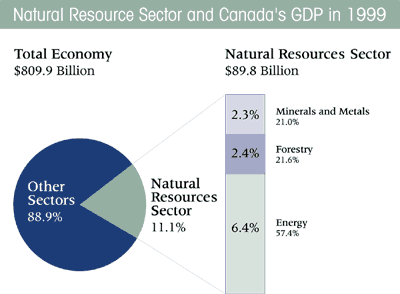ARCHIVED - Sustainable Development
Information Archived on the Web
Information identified as archived on the Web is for reference, research or recordkeeping purposes. It has not been altered or updated after the date of archiving. Web pages that are archived on the Web are not subject to the Government of Canada Web Standards. As per the Communications Policy of the Government of Canada, you can request alternate formats. Please "contact us" to request a format other than those available.
Introduction
Putting Sustainable Development Into Context
Canada’s natural resources provide our society with a high standard of living and an enviable quality of life. This natural resource endowment generates economic opportunities and societal benefits that enrich the lives of all Canadians.
Along with this wealth of opportunity comes the responsibility to use these resources productively and efficiently, and to adopt environmentally-friendly methods and technologies in a manner that is socially responsible. Canada has a lead role to play in setting and maintaining international standards of environmental protection.

The principles of sustainable development enable Canada to build on its social, economic and environmental achievements to protect our natural heritage for the benefit of Canadians and our global neighbours, while maintaining the natural resources sector’s extraordinary economic performance and continuing to enhance Canadians’ quality of life.
Sustainable Development Challenges for the Natural Resources Sector
- To manage forests to sustain a broad range of different values and products
- To provide a safe, efficient, reliable and increasingly environmentally clean mix of energy options
- To recycle and reuse minerals and metals resources to maximize the social, economic and environmental benefits to Canadians
- To generate, analyze and disseminate data, information and knowledge to balance pressures on land use and assist in policy development
Resource development is crucial to our economy, accounting for 11% of GDP and $100 billion per year in exports. Canada’s natural resources also underwrite extensive social benefits. More than 3.6 million Canadians in over 650 communities, many of which are rural, northern and remote, rely on the energy, forest and minerals and metals industries. Direct employment in the sector accounts for almost 750, 000 jobs. Wealth created from these jobs supports a high standard of living and the necessary financial resources to invest in social infrastructure such as health and education.
Countless more communities, in countries around the world, depend on a steady supply of Canada’s resources for their own economic growth and social development.
Natural resources are equally critical environmental assets. Canada has almost 10% of the world’s freshwater, 10% of the world’s forests and an estimated 300,000 species of wildlife. As stewards of these precious and indispensable resources, we have a duty to ensure they are used wisely, and to establish policies and programs to conserve and protect these assets.
We increasingly face trade-offs as we try to reconcile the sometimes competing expectations and pressures that arise when integrating economic, environmental and social factors into decision-making.
For example, it is difficult to rationalize the apparent dichotomy when consumers demand action on global warming yet continue to put more cars on the road. At the same time there is a demand for more reliable products and the economic spin-offs associated with their development, there are also calls to protect wilderness areas for recreation and wildlife related activities. Even potential solutions to environmental challenges, such as emerging biotechnology breakthroughs, often raise complex social or ethical issues that defy easy answers.
Striking the right balance sometimes seems elusive. However, there is no option but to find solutions if we are to continue to meet consumers’ needs for resource-based products while creating jobs, increasing productivity, expanding export markets, and advancing both our domestic and international environmental stewardship goals and obligations.
Fortunately, in the span of a few short years, sustainable development has moved out of the periphery and towards the mainstream. Organizations, both public and private, are actively seeking ways to operationalize the concept. The challenge of sustainable development demands action at all levels. NRCan, along with most other jurisdictions, applies the Brundtland definition of sustainable development to its work: “Development that meets the needs of the present without compromising the ability of future generations to meet their own needs.”
Based on this definition, NRCan demonstrates that by integrating social, economic and environmental considerations into decision-making we can respect the needs, values and property rights of all users of the land and its resources. While taking an integrated approach sometimes poses challenges, it also opens up opportunities to improve our standard of living and enrich our quality of life, both now and for the future.
Page details
- Date modified:


